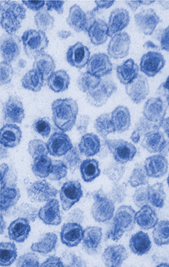 Allison F. can pinpoint the exact day she fell ill. She was at work talking to her boss. “I suddenly felt like a truck hit me. I was weak, dizzy, achy, nauseous and feverish. It felt similar to the onset to the flu, but exceedingly more intense,” she writes. She went home, thinking she had a virus, but she never recovered. Eventually, she was diagnosed with chronic fatigue syndrome.
Allison F. can pinpoint the exact day she fell ill. She was at work talking to her boss. “I suddenly felt like a truck hit me. I was weak, dizzy, achy, nauseous and feverish. It felt similar to the onset to the flu, but exceedingly more intense,” she writes. She went home, thinking she had a virus, but she never recovered. Eventually, she was diagnosed with chronic fatigue syndrome.
Today, she lives with her mother and rarely leaves the house. She struggles with pain, migraines, exhaustion, and neurological problems. “There have been nights when I’ve had serious doubt about whether or not I would make it through until morning (and times when I didn’t care if I did),” she writes.
Chronic fatigue syndrome belongs to group of disorders that has long frustrated researchers—those with no known cause. Scientists have proposed everything from psychiatric illness to infectious agents to hormone imbalances to explain chronic fatigue. But nothing stuck.
Then, in 2009, researchers from the Whittemore Peterson Institute, a private research center funded by the parents of a child with chronic fatigue, uncovered a link between chronic fatigue and a newly discovered retrovirus called XMRV (short for xenotropic murine leukemia virus-related virus). The team collected blood samples from 101 people diagnosed with chronic fatigue and 208 people without the illness. When they screened these samples, they found that 67% of the chronic fatigue sufferers had XMRV, compared to just 3.7% of the healthy controls. Of course, they couldn’t prove that the virus was causing the disease. Still, patients were elated. “I just feel like the whole future has changed for us,” Anne Ursu, a writer with chronic fatigue, told The New York Times.
The initial good news, however, was soon followed by bad. Early this year, two separate groups of British researchers failed to find any link between the virus and CFS (study one, study two). A third group, from the Netherlands, also failed to find a link. A CDC study, published in July, confirmed the lack of an association: The researchers took blood samples from 51 people with chronic fatigue and 53 healthy controls, but they couldn’t find any evidence of XMRV in either group. The initial study, it appeared, had been a fluke.
But then, just a month later, a new paper came out in PNAS. This time the researchers, scientists from the National Institutes of Health and US Food and Drug Administration, did find an association. They uncovered gene sequences from murine leukemia viruses (MLV), a class of viruses closely related to XMRV, in 86.5% of the patients with chronic fatigue. Only 10% of healthy controls had the MLV sequences.
The most recent paper, however, which appeared in this month’s Journal of Infectious Diseases, frustratingly suggests that there is no link. A team of Harvard researchers failed to find any evidence of XMRV in 32 chronic fatigue patients, 43 HIV patients, 97 people with rheumatoid arthritis, 26 people who received organ transplants, and 95 patients who came into the clinic for general care. Lead researcher Athe Tsibris told the Los Angeles Times that his team used the exact same methods as the Whittemore group. “We found nothing,” Tsibris told the Times. “I would say that is the largest surprise for us. We could not detect XMRV in any sample.”
Why the wild discrepancies? Experts aren’t sure, but they came up with a few ideas at the 1st International Workshop on XMRV in September. It’s possible that the populations being studied differ in some meaningful way, or that the ways some groups are selecting cases for their studies are biased. It’s also possible that the the positive findings are the result of contamination. Or, the assays used to look for the virus could be to blame.
Despite the contradictory results, patients with chronic fatigue have already begun looking for ways to combat XMRV. Jamie Deckoff-Jones, a physician with chronic fatigue and XMRV, began taking antiretrovirals (the drugs used to treat HIV, another retrovirus) in April. She has been blogging about her experience ever since. (Her daughter, who also has chronic fatigue and XMRV, is taking the medication too.)
Experts, however, say it’s too soon to know whether antiretrovirals will do any good. At the October meeting of the Chronic Fatigue Syndrome Advisory Committee, Stuart LeGrice, a researcher at the National Cancer Institute, encouraged patients to hold off on taking the drugs until they can be tested in a clinical trial. No doubt people like Deckoff-Jones and Allison F. hope that will happen sooner rather than later.
Photo credit: Centers for Disease Control and Prevention
Thanks for the balanced summary. My daughter and I are doing very well, in our eighth month of HAART. Great website.
Jamie Deckoff-Jones MD
http://treatingxmrv.blogspot.com/